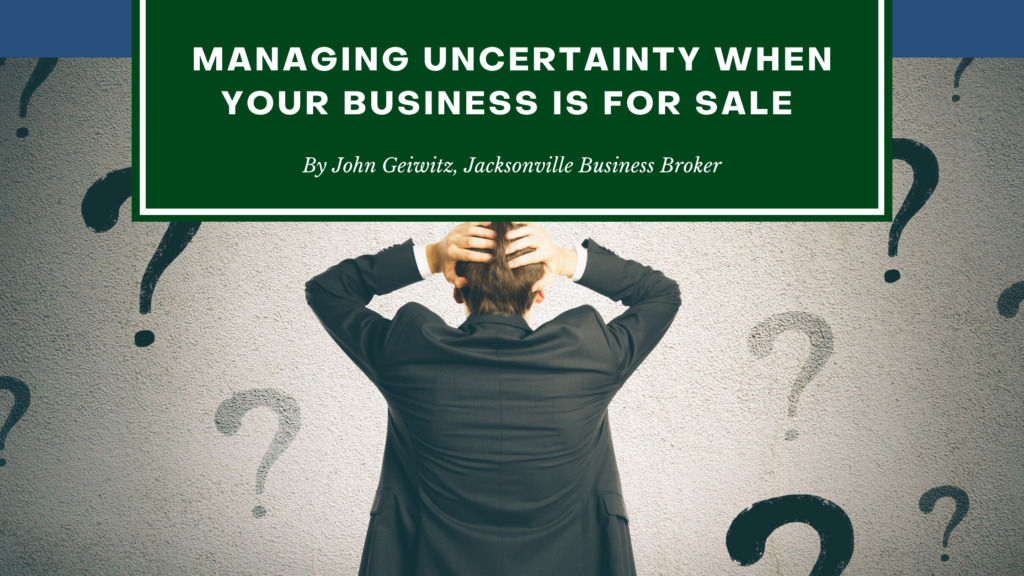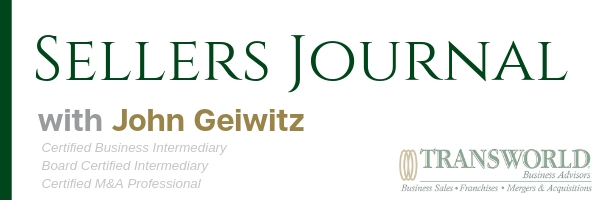
Part II: Managing Uncertainty When Your Business Is For Sale
Confidentiality is paramount when selling your business. Loose lips sink ships! This is the second article in the three-part series on confidentiality.
Confidentiality in the sale of a business includes:
- The fact that the business is for sale,
- Financial data,
- Intellectual capital,
- Proprietary processes and,
- A myriad of other information that must be protected.
In the first article, I discussed timing. Timing is everything! The shorter the timetable between going to market and the sale, the less chance there is for a leak. (Click here for the full version of the first article on timing.)
This second article involves managing uncertainty in the selling process and what to disclose.
In the third article, I will discuss how to disclose the sale of your business correctly.
Let’s discuss the implications of managing uncertainty for others in the selling process.
MANAGING UNCERTAINTY
Managing uncertainty among stakeholders matters because the element of uncertainty leads to different responses when a business is marketed for sale. Stakeholders include suppliers, employees and customers who have existing relationships with the business owner. These relationships can change in various ways when the business is sold.
A Few Examples:
- Customers expect a certain level of quality from the business, but there is no guarantee that they can expect to receive the same level of quality once the business sold. Loss of sales can damage both the business and the sale price.
- Suppliers may impose different terms that can affect operations and accounting.
- Employees may be understandably concerned about their job security. As a result, employee productivity can fall, and/or employees may even start to look elsewhere for a job.
Any of these scenarios involving stakeholders such as customer-, supplier- and employee- uncertainty can be devastating to the sale of a business and must be managed.
Who is the first person who comes to your mind who would think his or her life or business could be impacted (whether real or perceived) when you are no longer in the picture?
How might he or she respond?
To manage uncertainty concerning stakeholders, confidentiality is paramount. A Non-Disclosure-Agreement (NDA) is one tool to enhance confidentiality. NDAs must always be utilized and enforced. Among other things, NDAs prevent the buyer from passing on sensitive information to stakeholders such as customers, suppliers, employees, and competitors. When sellers require and enforce NDAs, buyers can access the information they need to make an informed decision. However, third parties will not be able to learn of the sale of the business from the buyer. Business intermediaries, with their understanding of confidentiality and its potential impacts, can advise on the best way to implement confidentiality documents such as NDAs, as well as what to disclose in other documents in the selling process.
What details need to be disclosed?
Next, let’s discuss managing uncertainty for you in the selling process.…especially what information to disclose.
- Warranties tend to be factual statements about the company. A breach of warranty in the case of the seller providing false information- whether it is intentional or a simple misunderstanding- could open the seller up to claims for damages from the buyer, even after the business is sold.
- Indemnities are promises to reimburse the buyer in the case of certain events, causing a loss to the buyer.
Writing warranties and/or indemnities into the sale agreement gives the buyer an understanding of the business’s current position together with a measure of protection. However, the inclusion of warranties and indemnities typically pushes the sale price higher. Protecting yourself from liability and managing the sale price are reasons it is extremely important to utilize an experienced business intermediary.
Use a Certified Business Intermediary (CBI)
Among many other things, a certified business intermediary (CBI) can assist you in drafting a customized disclosure letter that suits your needs and protects you as the seller. In preparation of the disclosure letter, the CBI can advise:
- Whether warranties, indemnities or both are most appropriate,
- Whether specific clauses and exceptions to warranties and indemnities are needed,
- What should be included such as a statement that the company’s assets reach a certain value, and
- Limits to place on the sellers’ liability.
This disclosure letter may become part of the selling agreement or the buyer’s letter of intent. As your CBI gets to know you and your business, he or she will provide guidance on what to disclose in the disclosure letter and how to manage uncertainty through NDAs. The disclosure letter and NDA, if executed properly, are excellent tools for protecting your confidential information. Your CBI can be your best resource for implementing these tools to protect you and your business and manage uncertainty in the sales process.
There is no question there are a lot of moving parts when selling a business; and confidentiality is one of the most critical factors.
To subscribe and receive Part 1: Confidentiality Is Paramount and Part 3: Disclosing Correctly of this article, or to strategize your exit from your own business, please call 904-647-4755.



